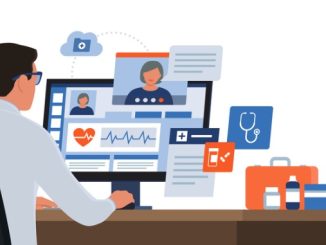
The pandemic forced primary care practices to change virtually overnight, but will these changes now stay forever?
As the country was encouraged to stay at home to protect the NHS and save lives; GP consultations went remote to minimise in-person contact. Now it is estimated that face-to-face consultations have fallen to 10% of their previous level. However, some argue that an inpersonal future for primary care would result in negative consequences.
There have been numerous observational studies that have shown that continuity of care is significantly associated with higher patient satisfaction, better adherence to medical advice, better adherence to prescribed medication, better take-up of personal preventive medicine, fewer emergency department visits and fewer admissions to hospital – especially for older people. Furthermore, two recent systematic reviews, one of them focused on primary care, showed that continuity of care by doctors is associated with reduced mortality.
It is also reported that empathy shown by GPs is valued highly by patients. Empathy is associated with significantly greater patient satisfaction, and enablement, along with fewer metabolic complications, reduced patient anxiety and, perhaps most strikingly, reduced all-cause mortality in people with diabetes. Many commentators in the healthcare sector are worried that remote consultations take away the all important components of empathy and personalisation. However, as the pandemic isn’t going anywhere soon, the priority must still be keeping patients safe – which is most easily achieved by reducing in-person consultations.
However, remote consulting can be adapted to ensure continuity and empathy are as prevalent as possible. For example, ensuring that electronic messages, and requests for ‚phone calls, are answered by the patient’s own GP whenever possible personalises the experience for the patient. Many GPs also find remote consulting easier with patients they know, and patient satisfaction is significantly better when GPs have responsibility for a defined lists of patients rather than adopting combined lists, though the potential for continuity within very small teams in larger practices should be evaluated.
The length of consultations is also an important element in increasing patient satisfaction. The benefits of longer appointments have been seen in many practices which report annual face-to-face consultation rates as low as two per patient when using personal, rather than combined, lists and introducing 15 minute consultations. Now there are fewer face-to-face consultations, more time should be freed-up to increase appointment times. Longer consultations are both more patient-centred and less stressful for clinicians, and the UK is an international outlier in its reliance on short consultations. With pre-booked, remote, consultations now the norm, demand can be modified to free-up time for longer consultations.
A key question for all countries and sectors is which changes to keep or discard after the pandemic? UK general practice faces a choice between a personal or impersonal future. This period should be used as a time to progress to a more personal patient experience as the benefits have been shown to be great.


Be the first to comment